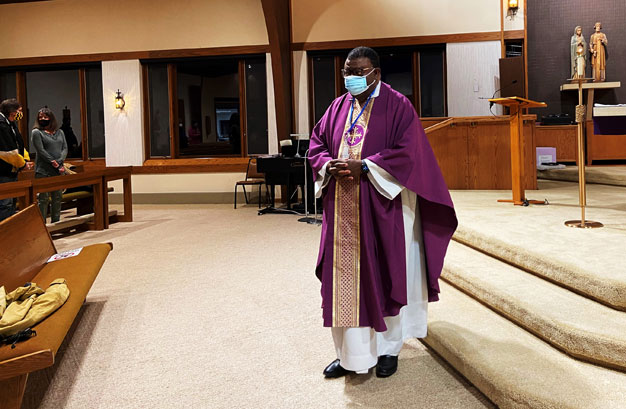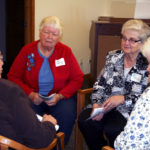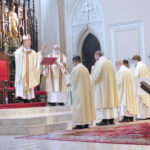
Father Apo Mpanda processes out of the sanctuary after Mass at Our Lady of the River Parish in LeClaire Feb. 20. Father Mpanda shares his experience with racism with The Catholic Messenger.
By Barb Arland-Fye
The Catholic Messenger
Last fall, Father Apo Mpanda, a native of the Democratic Republic of Congo, gave a homily on his experience of racism. Bishop Thomas Zinkula had encouraged the priests of the Diocese of Davenport to speak on racism in the aftermath of protests and riots spurred by the killing of Black individuals while in police custody. Father Mpanda responded by sharing his story with the parishes he serves, Our Lady of the River in LeClaire and Church of the Visitation in Camanche.
“I would like to thank Bishop Zinkula for his leadership in this matter,” Father Mpanda told The Catholic Messenger in a later interview. He particularly appreciated the bishop’s courage in sharing the story of his own family’s experience with racism.
Father Mpanda counts many friends among the clergy and laity he has met since his arrival in the Davenport Diocese 21 years ago. The few incidents of racism he experienced in his ministry do not overshadow the relationships he has developed with people of different races, but the memories sting.
While serving at a parish in the diocese some years ago, he answered a call to travel 25 miles away to a hospital to administer the anointing of the sick to a parishioner. When Father entered the patient’s hospital room, a nurse was explaining to the patient that he needed a blood transfusion. The patient “looked at the nurse and said, ‘Make sure it isn’t a Black man’s blood,’” Father Mpanda recalled.
The comment stunned the priest and the nurse. The patient followed up with a question that left the priest feeling incredulous. “If I die, am I going to go to heaven?” the patient asked. Father Mpanda responded by asking the patient if he thought receiving the sacrament from a Black man would lead him to heaven.
Father Mpanda recalls another time when he received a visit in his office from a man who belonged to the parish where the priest would take up a new assignment. The man said, “Father I used to hate the Black people.” “I asked him why, and he told me about having a conflict with a Black guy in the military service. I joked with him, ‘Now you will have to behave.’”
He recalled another incident of racism that happened about six years ago, while he was serving a different parish. During the staff meeting, one of the staffers “out of the blue, looked at me, with a crayon in her hand, and asked, ‘Do you have crayons in Africa?’ Then she talked about people in Africa walking around naked and barefoot and that when they see an elephant they run and climb up the tree.” The staffer’s comments shocked everyone present. The room was quiet, the priest said.
While he was upset by the staffer’s inexplicable comments, he was more upset that the clergy present during that meeting “didn’t condemn what they had heard. Archbishop Desmond Tutu said that ‘If you are neutral in situations of injustice, you have chosen the side of the oppressor. If an elephant has its foot on the tail of a mouse and you say that you are neutral, the mouse will not appreciate your neutrality.’”
The vast majority of people treat Father Mpanda with respect, and he hopes it is not simply because he wears a Roman collar. “I want to be respected as a human being and not because I am a priest or because I am Catholic,” he said. “Racism is a lack of respect for the human dignity.”
He spoke during his homily of God’s love for everyone, as revealed in Scripture. “The church has to welcome everybody regardless of their social or economic status. The church has to include everybody and to incorporate everybody. That’s why it is called a universal church.”
He appreciates that the U.S. Conference of Catholic Bishops (USCCB) has talked about racism and issued its latest pastoral letter in 2018 titled “Open Wide Our Hearts: The Enduring Call to Love.” The bishops have issued several statements over the past half-century on racism, but some Black Catholic leaders, theologian Father Bryan Massingale in particular, say actions must follow words. Catholics must address the issue as a systemic issue that affects all aspects of life — from housing, education and law enforcement to business, health care and the church.
On a small-scale level, Father Mpanda sees signs of encouragement in such places as St. Anthony Parish in Davenport, where he served prior to his current assignments. It has become more global, with parishioners representing a variety of cultures, races and backgrounds. He said the parish’s inclusiveness led to St. Mary Parish in Davenport choosing to merge with St. Anthony Parish. “People felt welcome at St. Anthony’s. Education about race begins with getting to know people of different cultures and races, and engaging in dialogue.”
Post-pandemic, he plans to invite the Congolese choir from Iowa City to share their musical gifts at the parishes that he serves in LeClaire and Camanche. He has discovered that lively, expressive music can create a bridge to link people of different cultures and races.











